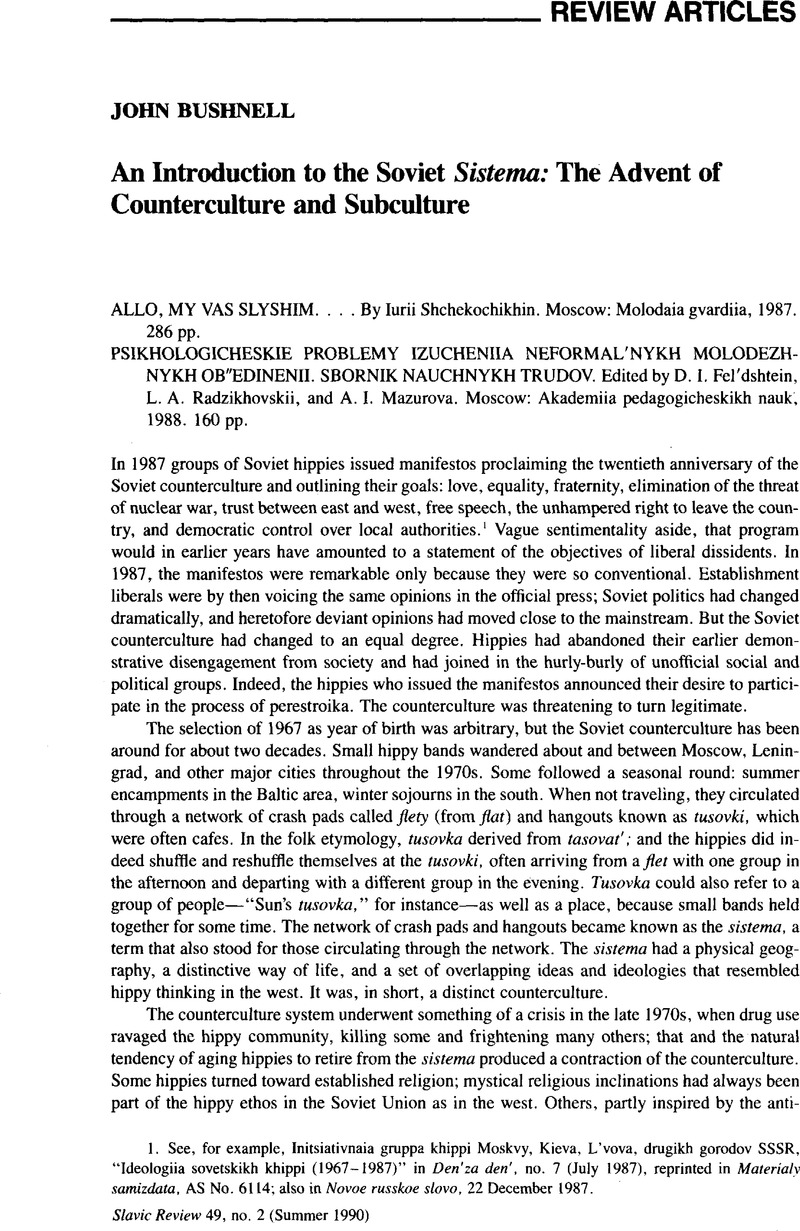No CrossRef data available.
Article contents
An Introduction to the Soviet Sistema: The Advent of Counterculture and Subculture
Published online by Cambridge University Press: 27 January 2017
Abstract

- Type
- Review Articles
- Information
- Copyright
- Copyright © Association for Slavic, East European, and Eurasian Studies. 1990
References
1. See, for example, Initsiativnaia gruppa khippi Moskvy, Kieva, L'vova, drugikh gorodov SSSR, “Ideologiia sovetskikh khippi (1967–1987)” in Den'za den', no. 7 (July 1987), reprinted in Materialy samizdata, AS No. 6114; also in Novoe russkoe slovo, 22 December 1987.
2. Few published sources exist on the Soviet counterculture. Vesti iz SSSR and Materialy samizdata offer episodic information, and western observers provide occasional reports. See, for example, Andrea Lee, Russian Journal, N.Y., 1981, 90–100. See also Joshua Rubenstein, Soviet Dissidents. Their Struggle for Human Rights, rev. ed. Boston, 1985, 275–288, for accounts of the career of Sergei Batovrin, a hippy of the 1970s who became a pacifist in the early 1980s, and of countercultural pacifist groups; and Nikolai Khramov, “Is It Easy to be Truthful? Reflections in a Movie Theater,” Across Frontiers 4 (Winter 1988), a retrospective account by a pacifist with contacts in the counterculture. My reconstruction is based in part on discussion with participants in the counterculture. The youth groups of the 1980s have received considerable— if not always accurate—coverage in the Soviet press.
3. Some of his articles were also republished in pamphlet form in Trudnyi podrostok (1979) and Podrostok v trudnoi situatsii (1982), both in the series “Narodnyi universitet. Pedagogicheskii fakul'tet.” Much of Trudnyi podrostok reappears in Allo, my vas slyshim. Shchekochikhin's eminence as a commentator on adolescent groups was certified by the publication of his “Po kom zvonit kolokol'chik?” in Sotsiologicheskie issledovaniia, no. 1 (1987); 81–96; that article, too, reappears unacknowledged in Alio, my vas slyshim. Lately, Shchekochikhin has produced a number of plays and film scripts on the youth theme.
4. Iurii Shchekochikhin, “Predislovie k razgovoru,” Literaturnaia gazeta, 6 June 1984.
5. At the end of a transcript of a discussion with representatives of several groups that took up an entire newspaper page, Shchekochikhin noted that he had had to edit down the original, which ran to one hundred pages; Iurii Shchekochikhin, “Na perekrestke,” Literaturnaia gazeta, 22 October 1986. This is reprinted in Alio, my vas slyshim, 230–241.
6. Compare Shchekochikhin, Allo, my vas slyshim, 253–255, with S. Leskov, “Fal'shivye strasti,” Komsomol'skaiapravda, 11 June 1982, and V. Kulikov, “Besprizornye ‘fanaty',” Komsomol'skaiapravda, 5 October 1986. These sources present the same Spartak leader under different names.
7. They are identified in the collection only by their degrees, not as police officers. The police identification was provided with articles they contributed to Sotsiologicheskie issledovaniia, 1987, nos. 4 and 5.


